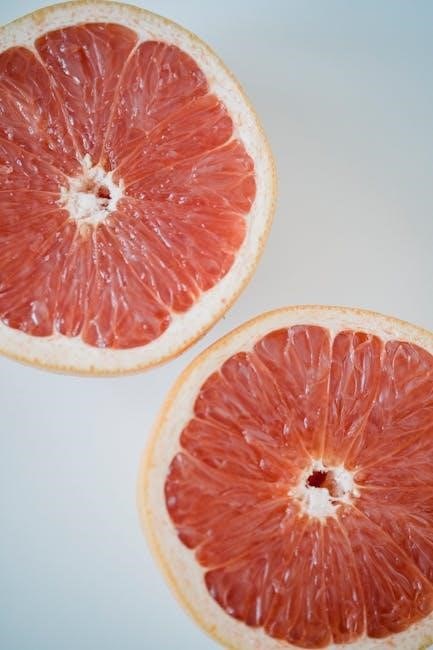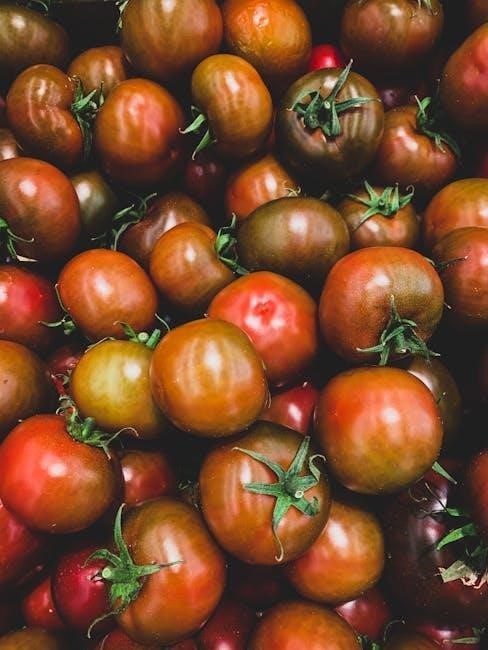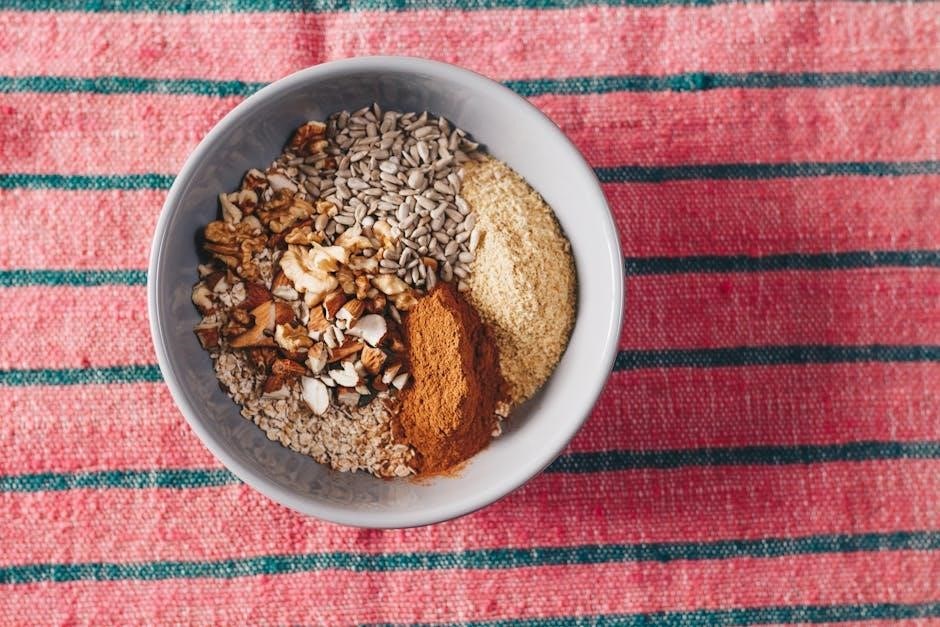Anti-inflammatory foods are essential for reducing chronic inflammation‚ which can prevent diseases like heart disease and arthritis. Incorporating these foods into your diet promotes long-term health benefits.
What Are Anti-Inflammatory Foods?
Anti-inflammatory foods are dietary components that help reduce inflammation in the body. These foods are rich in antioxidants‚ omega-3 fatty acids‚ and polyphenols‚ which combat harmful free radicals and promote healing. Examples include fatty fish‚ dark leafy greens‚ berries‚ and whole grains. They work by minimizing the production of pro-inflammatory molecules‚ such as cytokines and enzymes‚ which contribute to chronic inflammation. Incorporating these foods into your diet can help alleviate conditions like arthritis‚ heart disease‚ and even mental health disorders. A well-balanced intake of anti-inflammatory foods supports overall health and longevity by maintaining cellular balance and immune function. They are a natural way to protect against inflammation-related diseases.
The Importance of Reducing Inflammation
Reducing inflammation is crucial for preventing chronic diseases like heart disease‚ diabetes‚ and cancer. Chronic inflammation can damage tissues and organs‚ leading to long-term health issues. Anti-inflammatory foods play a key role in minimizing this damage by combating harmful molecules and promoting healing. By incorporating these foods into your diet‚ you can lower your risk of developing conditions such as arthritis‚ autoimmune disorders‚ and even mental health issues. Reducing inflammation also improves digestion‚ enhances energy levels‚ and supports overall well-being. It’s not just about treating symptoms but preventing long-term damage and promoting a healthier‚ more balanced lifestyle. A diet rich in anti-inflammatory foods is a proactive step toward better health.
How Diet Impacts Inflammation
Diet plays a significant role in managing inflammation. Certain foods can either trigger or reduce inflammatory responses. Anti-inflammatory foods‚ such as fatty fish‚ berries‚ and dark leafy greens‚ are rich in antioxidants and omega-3 fatty acids‚ which help combat inflammation. On the other hand‚ processed foods‚ refined carbohydrates‚ and red meats can promote inflammation. A diet high in whole‚ nutrient-dense foods supports the body’s natural anti-inflammatory processes‚ while a diet heavy in processed foods can lead to chronic inflammation. Balancing your diet with anti-inflammatory foods can help maintain healthy cells and reduce the risk of diseases associated with inflammation. This makes dietary choices a powerful tool in managing inflammation.

Key Foods to Include in an Anti-Inflammatory Diet
Incorporate fatty fish‚ dark leafy greens‚ cruciferous vegetables‚ berries‚ nuts‚ seeds‚ whole grains‚ healthy fats‚ and anti-inflammatory herbs like turmeric and ginger to reduce inflammation effectively.
Fatty Fish (Salmon‚ Mackerel‚ Sardines‚ Trout)
Fatty fish are rich in omega-3 fatty acids‚ particularly EPA and DHA‚ which are potent anti-inflammatory agents. These acids inhibit the production of inflammatory molecules‚ reducing chronic inflammation. Salmon‚ mackerel‚ sardines‚ and trout are excellent sources. Regular consumption supports heart health‚ lowers arthritis risk‚ and improves brain function. Aim for 2-3 servings weekly for optimal benefits. Their anti-inflammatory properties make them a cornerstone of a healthy diet. Include them in meals like salads‚ stir-fries‚ or as a baked dish for a nutrient-rich‚ inflammation-fighting addition to your menu.
Dark Leafy Greens (Kale‚ Spinach‚ Arugula)
Dark leafy greens are packed with antioxidants like polyphenols and vitamins A‚ C‚ and K‚ which combat inflammation. Kale‚ spinach‚ and arugula are rich in anti-inflammatory compounds that protect cells from damage. These greens also contain minerals like calcium and magnesium‚ which support overall health. Regular consumption reduces inflammation markers‚ benefiting conditions like arthritis and heart disease. Incorporate them into smoothies‚ salads‚ or sauté them as a side dish. Their nutrient density makes them a powerful addition to an anti-inflammatory diet‚ promoting long-term wellness and disease prevention. Aim for 1-2 servings daily to maximize their benefits.
Cruciferous Vegetables (Broccoli‚ Cauliflower‚ Brussels Sprouts)
Cruciferous vegetables like broccoli‚ cauliflower‚ and Brussels sprouts are rich in sulforaphane‚ a compound known for its potent anti-inflammatory properties. These vegetables contain vitamins C and K‚ fiber‚ and antioxidants that help reduce inflammation and protect against chronic diseases. Broccoli‚ in particular‚ has been shown to inhibit inflammatory pathways in the body. Including these vegetables in your diet can support immune function and reduce the risk of conditions like heart disease and cancer. Steam‚ roast‚ or sauté them to retain their nutritional benefits. Regular consumption supports overall health and is a key component of an anti-inflammatory diet. Aim for variety to maximize their benefits.
Berries (Blueberries‚ Strawberries‚ Raspberries‚ Cherries)
Berries are packed with antioxidants like anthocyanins‚ which reduce inflammation and protect against chronic diseases. Blueberries and strawberries are particularly high in vitamin C and fiber‚ promoting immune function and digestive health. Cherries contain anti-inflammatory compounds that may alleviate arthritis symptoms. Raspberries are rich in ellagic acid‚ which combats inflammation and supports cancer prevention. Incorporating a variety of berries into your diet can help lower inflammation‚ improve heart health‚ and enhance cognitive function. Enjoy them fresh‚ frozen‚ or in smoothies for a nutrient-dense‚ anti-inflammatory boost. Berries are versatile and can be added to meals‚ snacks‚ or desserts for added flavor and health benefits. Regular consumption supports overall well-being and disease prevention.
Nuts and Seeds (Walnuts‚ Flaxseeds‚ Chia Seeds)
Nuts and seeds are rich in anti-inflammatory compounds‚ making them a great addition to your diet. Walnuts are high in omega-3 fatty acids‚ particularly alpha-linolenic acid (ALA)‚ which helps reduce inflammation. Flaxseeds are another excellent source of ALA and fiber‚ supporting digestive health and lowering inflammation. Chia seeds are packed with omega-3s and fiber‚ promoting heart health and reducing inflammatory markers. These nuts and seeds also contain antioxidants like vitamin E and magnesium‚ which further combat inflammation. Incorporating them into meals‚ such as adding walnuts to salads or chia seeds to smoothies‚ can provide sustained anti-inflammatory benefits and support overall well-being. They are versatile and nutrient-dense‚ making them a valuable part of an anti-inflammatory diet. Regular consumption can help mitigate chronic inflammation and improve long-term health outcomes.
Whole Grains (Oats‚ Quinoa‚ Brown Rice)

Whole grains like oats‚ quinoa‚ and brown rice are rich in fiber‚ vitamins‚ and minerals‚ making them a key component of an anti-inflammatory diet. Oats contain a type of fiber called beta-glucan‚ which has been shown to reduce inflammation and improve immune function. Quinoa is a complete protein and a good source of magnesium‚ a mineral that helps regulate inflammatory responses. Brown rice is high in antioxidants and fiber‚ which support gut health and reduce inflammation. These whole grains are also low on the glycemic index‚ preventing spikes in blood sugar that can trigger inflammation. Incorporating them into meals helps promote long-term health and well-being.
Healthy Fats (Olive Oil‚ Avocado)

Healthy fats‚ such as olive oil and avocado‚ are crucial in an anti-inflammatory diet due to their rich content of antioxidants and monounsaturated fats. Olive oil contains oleocanthal‚ which has anti-inflammatory properties similar to ibuprofen. Avocados are packed with antioxidants like vitamin E and polyphenols‚ which help reduce inflammation and improve heart health. These fats also support the absorption of fat-soluble vitamins and minerals‚ enhancing overall nutrient uptake. Incorporating olive oil into dressings and using avocado as a nutritious addition to meals can significantly lower inflammation and promote a balanced diet. They are also key components of the Mediterranean diet‚ known for its anti-inflammatory benefits.
Herbs and Spices (Turmeric‚ Ginger‚ Garlic)
Turmeric‚ ginger‚ and garlic are potent anti-inflammatory herbs and spices. Turmeric contains curcumin‚ a powerful compound with strong anti-inflammatory and antioxidant properties. Ginger has gingerol‚ which reduces inflammation and aids digestion. Garlic contains sulfur compounds like allicin‚ known to combat inflammation and improve heart health. These spices are versatile and can be added to various dishes‚ from soups to stir-fries. Incorporating them into meals not only enhances flavor but also supports overall well-being by reducing inflammation and boosting immunity. Their natural anti-inflammatory effects make them essential additions to an anti-inflammatory diet‚ promoting long-term health benefits without the need for supplements.
Foods to Avoid for Reducing Inflammation

Processed foods‚ refined carbohydrates‚ red and processed meats‚ dairy‚ and high-sugar foods can trigger chronic inflammation‚ worsening conditions like arthritis and heart disease. Avoid them to reduce inflammation.
Processed Foods (Packaged Snacks‚ Sugary Drinks)
Processed foods‚ such as packaged snacks and sugary drinks‚ are high in unhealthy ingredients like added sugars‚ refined carbs‚ and trans fats. These foods promote inflammation by triggering oxidative stress and insulin spikes. Regular consumption can lead to chronic inflammation‚ increasing the risk of heart disease‚ diabetes‚ and obesity. They often contain artificial additives and preservatives that further exacerbate inflammation. To reduce inflammation‚ it’s crucial to limit or avoid these foods and opt for whole‚ nutrient-dense alternatives. Staying hydrated with water or herbal teas instead of sugary drinks can also help mitigate inflammation and support overall health.
Refined Carbohydrates (White Bread‚ Pasta‚ Rice)
Refined carbohydrates‚ such as white bread‚ pasta‚ and rice‚ are stripped of fiber and nutrients‚ leading to rapid spikes in blood sugar. This triggers inflammation by causing insulin resistance and oxidative stress. Regular consumption can contribute to chronic inflammation‚ increasing the risk of conditions like diabetes and heart disease. Refined carbs also lack essential vitamins and minerals‚ further disrupting the body’s balance. To reduce inflammation‚ it’s important to limit these foods and replace them with whole‚ unprocessed alternatives like whole-grain bread‚ quinoa‚ or brown rice‚ which provide sustained energy and anti-inflammatory benefits.
Red and Processed Meats (Beef‚ Pork‚ Hot Dogs)
Red and processed meats‚ such as beef‚ pork‚ and hot dogs‚ are known to trigger inflammation due to their high content of advanced glycation end (AGE) products and preservatives like sodium nitrate. These compounds can cause oxidative stress and inflammation in the body. Regular consumption has been linked to chronic conditions‚ including heart disease and certain cancers. To reduce inflammation‚ it’s advisable to limit red meat intake and avoid processed meats altogether. Opt for lean‚ grass-fed options or plant-based alternatives to minimize exposure to pro-inflammatory substances and promote overall health;
Dairy Products (Especially for Those with Sensitivities)
Dairy products can trigger inflammation in individuals with lactose intolerance or sensitivity to casein‚ a protein found in milk. Excessive consumption of processed dairy‚ such as cheese and butter‚ may also promote inflammation due to saturated fats and added preservatives. For those with sensitivities‚ plant-based alternatives like almond‚ coconut‚ or oat milk are better options. However‚ moderate amounts of natural‚ unprocessed dairy‚ such as yogurt with live cultures‚ may be tolerated and even beneficial for gut health. Balancing dairy intake and choosing less inflammatory sources can help reduce overall inflammation and support a healthier diet.
High-Sugar Foods (Candy‚ Pastries‚ Fried Foods)
High-sugar foods‚ such as candy‚ pastries‚ and fried foods‚ are known to promote inflammation in the body. These foods cause rapid spikes in blood sugar‚ leading to insulin resistance and oxidative stress‚ which can trigger chronic inflammation. Regular consumption of such foods is linked to an increased risk of conditions like diabetes‚ obesity‚ and heart disease. To reduce inflammation‚ it’s best to limit or avoid these items and opt for natural sources of sugar‚ such as fruits and vegetables. Incorporating mindful eating habits and choosing nutrient-dense alternatives can help mitigate the harmful effects of high-sugar diets and support overall health.

The Mediterranean Diet and Anti-Inflammation
The Mediterranean diet emphasizes whole‚ unprocessed foods‚ reducing inflammation by focusing on fruits‚ vegetables‚ whole grains‚ nuts‚ seeds‚ healthy fats‚ fish‚ and lean proteins‚ promoting long-term health benefits.
Overview of the Mediterranean Diet
The Mediterranean diet is a dietary pattern inspired by traditional eating habits of countries bordering the Mediterranean Sea. It emphasizes whole‚ unprocessed foods like fruits‚ vegetables‚ whole grains‚ nuts‚ seeds‚ and healthy fats such as olive oil. The diet is rich in fish and lean proteins while minimizing red and processed meats. It also includes moderate consumption of dairy‚ particularly yogurt and cheese‚ and encourages fermented foods like buttermilk for added nutritional benefits. This approach has been widely recognized for its anti-inflammatory properties‚ reducing the risk of chronic diseases like heart disease and arthritis. Regular hydration with water‚ herbal teas‚ and fermented drinks is also a key component. By focusing on nutrient-dense‚ minimally processed foods‚ the Mediterranean diet supports overall health and well-being. Additionally‚ it discourages high-sugar foods‚ refined carbohydrates‚ and processed snacks‚ which can promote inflammation. The diet’s balanced and sustainable nature makes it a popular choice for those seeking to adopt a long-term‚ inflammation-reducing lifestyle.
Key Components of the Mediterranean Diet
The Mediterranean diet focuses on whole‚ unprocessed foods like fruits‚ vegetables‚ whole grains‚ nuts‚ seeds‚ and healthy fats‚ particularly olive oil. It includes lean proteins such as fish and poultry‚ with an emphasis on fatty fish rich in omega-3s. Fermented foods like yogurt and buttermilk are encouraged for their probiotic benefits. Herbs and spices‚ such as turmeric and garlic‚ are used to enhance flavor instead of salt and sugar. The diet minimizes red and processed meats‚ refined carbohydrates‚ and high-sugar foods. Moderate consumption of dairy‚ especially yogurt and cheese‚ is also a key feature. This balanced approach promotes nutrient density and anti-inflammatory effects‚ supporting long-term health and well-being.
How the Mediterranean Diet Reduces Inflammation
The Mediterranean diet reduces inflammation by emphasizing nutrient-dense‚ anti-inflammatory foods. Its focus on fruits‚ vegetables‚ whole grains‚ and healthy fats‚ particularly olive oil‚ provides antioxidants and polyphenols that combat oxidative stress. Omega-3 fatty acids from fatty fish like salmon and mackerel help lower inflammatory markers. The diet’s avoidance of processed foods‚ refined sugars‚ and red meats minimizes pro-inflammatory triggers. Herbs and spices like turmeric and garlic add anti-inflammatory properties‚ further enhancing its benefits. By balancing these components‚ the Mediterranean diet creates a dietary pattern that not only reduces inflammation but also supports overall health and well-being‚ making it a sustainable choice for long-term disease prevention.

Meal Planning for Anti-Inflammation
Meal planning for anti-inflammation involves incorporating a variety of anti-inflammatory foods like fatty fish‚ dark leafy greens‚ berries‚ nuts‚ and whole grains to reduce inflammation effectively.
7-Day Anti-Inflammatory Meal Plan
Start your week with a balanced breakfast of oatmeal topped with berries and walnuts. For lunch‚ enjoy a grilled salmon salad with mixed greens and olive oil dressing. Dinner could feature stir-fried vegetables with turmeric and ginger. Snack on fresh fruit like apples or pears. On Tuesday‚ try avocado toast for breakfast‚ a quinoa bowl with roasted vegetables for lunch‚ and baked trout with steamed broccoli for dinner. Midweek‚ incorporate smoothies with spinach‚ chia seeds‚ and cherries. Include lean proteins like chicken or tofu in meals. Rotate between fatty fish‚ cruciferous vegetables‚ and whole grains to maintain variety. Stay hydrated with herbal teas and limit processed snacks for optimal results.
Breakfast Ideas (Oatmeal‚ Smoothies‚ Avocado Toast)
Begin your day with anti-inflammatory breakfast options. Oatmeal topped with berries‚ walnuts‚ and chia seeds offers a nutrient-packed start. Smoothies blending spinach‚ blueberries‚ flaxseeds‚ and avocado provide a boost of antioxidants. Avocado toast on whole-grain bread with a sprinkle of turmeric or red pepper flakes is another delicious choice. These meals are rich in omega-3s‚ fiber‚ and vitamins‚ helping to reduce inflammation and energize your morning. Incorporate these recipes into your routine for a healthy and flavorful breakfast that supports overall well-being.
Lunch Ideas (Salads‚ Grilled Fish‚ Quinoa Bowls)
Lunch can be a vibrant and nutritious meal with anti-inflammatory ingredients. Fresh salads featuring dark leafy greens like kale or spinach‚ mixed with cherry tomatoes‚ cucumbers‚ and a citrus vinaigrette‚ provide essential vitamins. Grilled fish such as salmon or trout‚ rich in omega-3s‚ can be paired with quinoa for a balanced meal. Quinoa bowls with roasted vegetables like broccoli and Brussels sprouts‚ drizzled with olive oil and a sprinkle of turmeric‚ offer a hearty option. These dishes are not only flavorful but also packed with anti-inflammatory properties‚ making them ideal for a midday meal that supports health and energy.
Dinner Ideas (Stir-Fries‚ Baked Salmon‚ Vegetable Soups)
Dinner can be both satisfying and anti-inflammatory with the right choices. Stir-fries made with cruciferous vegetables like broccoli‚ cauliflower‚ and Brussels sprouts‚ along with healthy fats like olive oil‚ are a nutritious option. Baked salmon seasoned with garlic and herbs like turmeric provides a boost of omega-3s. Vegetable soups with dark leafy greens‚ carrots‚ and celery‚ simmered in a low-sodium broth‚ offer a comforting and anti-inflammatory meal. These dinner ideas not only promote health but also cater to diverse tastes‚ ensuring a balanced and flavorful end to the day.

Additional Tips for Reducing Inflammation
- Stay hydrated with water and herbal teas.
- Exercise regularly to reduce inflammation markers.
- Practice stress management through meditation or yoga.
- Ensure adequate sleep for recovery.
Stay Hydrated (Water‚ Herbal Teas‚ Fermented Drinks)
Hydration is crucial for reducing inflammation‚ as water helps flush out toxins. Herbal teas‚ like chamomile and mint‚ offer anti-inflammatory properties. Fermented drinks‚ such as buttermilk with Jerusalem artichoke syrup‚ provide probiotics that support gut health. Staying hydrated not only reduces inflammation markers but also enhances overall bodily functions. Incorporate these beverages into your daily routine to promote wellness and complement your anti-inflammatory diet. Avoid sugary drinks that can trigger inflammation. Proper hydration‚ combined with nutrient-rich foods‚ creates a balanced approach to managing inflammation.
Exercise Regularly
Regular exercise is a powerful way to reduce inflammation and improve overall health. Activities like brisk walking‚ cycling‚ or swimming can lower inflammation markers and enhance bodily functions. Staying active complements an anti-inflammatory diet by promoting better nutrient absorption and detoxification. Even moderate exercise can make a significant difference in managing chronic inflammation. Pairing physical activity with a balanced diet rich in anti-inflammatory foods creates a holistic approach to wellness. Consistency is key‚ as regular movement helps maintain long-term benefits and supports a healthy lifestyle.
Manage Stress (Meditation‚ Yoga‚ Deep Breathing)
Chronic stress can trigger inflammation‚ making stress management crucial for overall health. Practices like meditation‚ yoga‚ and deep breathing help reduce cortisol levels‚ promoting relaxation and lowering inflammation. These activities enhance mental clarity and emotional well-being while supporting physical health. Regular mindfulness exercises can improve how your body responds to stress‚ creating a balanced environment that complements an anti-inflammatory diet. Consistency is key‚ as regular practice yields the best results in managing stress and inflammation. Incorporate these techniques into your daily routine to foster long-term wellness and resilience.
Get Adequate Sleep
Sleep plays a critical role in managing inflammation. Poor sleep quality or insufficient sleep can lead to increased inflammatory markers‚ exacerbating chronic conditions. Aim for 7-9 hours of quality sleep nightly to support your body’s natural repair processes. During sleep‚ the immune system recalibrates‚ reducing inflammation and promoting healing. Establish a consistent bedtime routine to improve sleep hygiene‚ such as avoiding screens before bed and creating a relaxing environment. Prioritizing sleep complements an anti-inflammatory diet‚ fostering overall well-being and resilience against disease. Addressing sleep deficits is essential for maintaining a balanced inflammatory response and enhancing long-term health outcomes.

Free Printable Anti-Inflammatory Foods List PDF
Download a comprehensive anti-inflammatory foods list in PDF format for easy reference. Perfect for grocery shopping and meal planning‚ it includes all essential foods to reduce inflammation.
How to Download the PDF
Downloading the anti-inflammatory foods list PDF is straightforward. Click the provided link‚ select the PDF format‚ and save it to your device. The file is free and instantly accessible.
Using the List for Grocery Shopping
The anti-inflammatory foods list PDF is a handy guide for grocery shopping. Print it out and use it to check off items like fatty fish‚ dark leafy greens‚ and berries. Organize your shopping trip by categorizing items‚ ensuring you don’t miss key ingredients. This list helps you make informed choices‚ focusing on whole‚ unprocessed foods that reduce inflammation. Refer to it regularly to maintain a balanced diet and promote overall health. It’s a simple yet effective tool for planning nutritious meals and snacks‚ keeping you on track with your anti-inflammatory diet.
Sharing the List with Others
Sharing the anti-inflammatory foods list PDF with friends and family can empower them to make healthier choices. Print or email the list to help others reduce inflammation and improve their well-being. Social media platforms are also a great way to spread awareness. Encourage others to use the list for meal planning and grocery shopping‚ emphasizing its benefits for chronic disease prevention. By sharing‚ you contribute to a healthier community. The list’s simplicity makes it easy for anyone to adopt an anti-inflammatory diet‚ fostering a supportive environment for long-term health goals. Sharing knowledge is a powerful way to inspire positive change.
Embracing anti-inflammatory foods can significantly reduce inflammation‚ promoting overall health and well-being. Use the provided list to guide your journey toward a healthier‚ more balanced lifestyle.
Anti-inflammatory foods play a crucial role in reducing chronic inflammation‚ which is linked to various health conditions. Key foods include fatty fish‚ dark leafy greens‚ berries‚ nuts‚ seeds‚ whole grains‚ and healthy fats. These foods are rich in antioxidants‚ omega-3 fatty acids‚ and fiber‚ which help combat inflammation. Incorporating these into your diet can improve overall health and reduce the risk of diseases like heart disease and arthritis. Herbs and spices‚ such as turmeric and ginger‚ also offer potent anti-inflammatory properties. By focusing on whole‚ unprocessed foods and avoiding pro-inflammatory options‚ you can create a balanced diet that supports long-term well-being.
The Long-Term Benefits of an Anti-Inflammatory Diet
An anti-inflammatory diet offers numerous long-term health benefits‚ including reduced risk of chronic diseases like heart disease‚ diabetes‚ and arthritis. By focusing on nutrient-dense foods‚ this diet supports weight management‚ improves mental clarity‚ and enhances longevity. Regular consumption of anti-inflammatory foods can also boost immune function and reduce the likelihood of autoimmune disorders; Additionally‚ it promotes healthier skin‚ joints‚ and digestion‚ leading to an overall better quality of life. Over time‚ this dietary approach can significantly lower inflammation‚ a key contributor to many age-related conditions‚ helping you maintain vitality and well-being as you age.
Encouragement to Start Your Journey
Embracing an anti-inflammatory lifestyle is a powerful step toward transforming your health. By incorporating nutrient-rich foods and avoiding pro-inflammatory options‚ you can reduce pain‚ boost energy‚ and enhance overall well-being. Start small—swap one unhealthy snack for a handful of berries or add a portion of leafy greens to your meals. Over time‚ these changes will compound‚ leading to lasting benefits. Use the anti-inflammatory foods list PDF as your guide to make informed choices. Remember‚ every meal is an opportunity to nourish your body and invest in a healthier future. Take the first step today and begin your journey toward a more vibrant‚ inflammation-free life!
